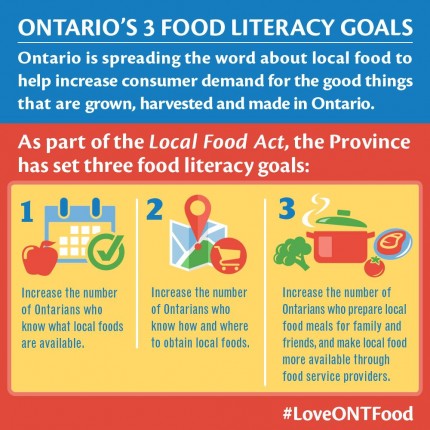An Edible Education For All
Posted: January 29, 2015
Categories: Edible Education Network / GoodFoodBites / News from Sustain Ontario / Ontario Food Policy / Policy News
FOR IMMEDIATE RELEASE
An Edible Education For All: Food Literacy Goals Celebrated
 The provincial government just made three small steps towards better food systems. Yesterday, the Ontario government released three much anticipated aspirational food literacy goals under the Local Food Act:
The provincial government just made three small steps towards better food systems. Yesterday, the Ontario government released three much anticipated aspirational food literacy goals under the Local Food Act:
- Goal 1: Increase the number of Ontarians who know what local foods are available.
- Goal 2: Increase the number of Ontarians who know how and where to obtain local foods.
- Goal 3: Increase the number of Ontarians who prepare local food meals for family and friends, and make local food more available through food service providers.
Sustain Ontario has been a central voice in consultations to establish these goals, connecting policymakers with educators, community food groups and farmers who are already busy on the ground educating Ontarians on where their food comes from and how and where to grow, prepare and purchase it.
“Improving food literacy is at the heart of school food work,” says Meredith Hayes, Acting Coordinator of the Ontario Edible Education Network. “By sharing knowledge about local foods, we grow a common language to talk about the importance of healthy eating, food accessibility, and supporting local producers in our communities.”
The Ontario Edible Education Network, hosted by Sustain Ontario, has been a leader in the consultation process; convening educators, parents and organizations that are working to improve food environments for children and youth. The network presented to the Standing Committee on Social Policy during the Local Food Act hearings and summarized the perspectives of Ontario stakeholders’ submissions in their paper, “A Discussion about Food Literacy Within the Context of the Local Food Act.” A second paper on food literacy interventions and performance indicators with respect to these goals is forthcoming.
“We’d like to congratulate the Ontario Ministry of Agriculture, Food and Rural Affairs on this milestone. We all win when food literacy improves and setting these goals is a very exciting step toward a healthy future for all Ontarians,” says Carolyn Young, Director of Sustain Ontario. “These are common goals that inspire important work and validate so much of the good work that is being done.”
Determining how to measure progress towards these goals is the next step. As leaders in the field of food literacy, Sustain Ontario, along with the Ontario Edible Education Network, are excited to amplify and animate this process.
Improving food literacy has wide implications for food and farming systems. Initiatives’ outcomes include increased income for local farmers through community-supported agriculture and food service contracts, more fresh food consumption linked to better mental and physical health outcomes, and safe and inclusive communities through farmers’ markets and school and community gardens.
From “A Discussion about Food Literacy Within the Context of the Local Food Act”
A number of food literacy concepts were repeatedly mentioned as being essential for building a strong food system in Ontario and for achieving broader health, economic, and socio-cultural goals. When many of these themes are drawn together, the submissions discuss food literacy as the understanding of:
- Local agriculture and where food comes from;
- How food systems impact individual health, broader societal and economic wellbeing, and the environment;
- How to grow, access, prepare, and prefer healthy, safe and nutritious food.
From the Ontario Ministry of Agriculture, Food and Rural Affairs
“Local food” is defined within the act as follows:
- food produced or harvested in Ontario, including forest or freshwater food, and
- subject to any limitations in the regulations, food and beverages made in Ontario if they include ingredients produced or harvested in Ontario;
-30-
For media inquiries, contact:
Jenn Kucharczyk
Communications Coordinator, Sustain Ontario
647-348-0235
jennifer@sustainontario.ca
Download PDF version of this media release: An Edible Education For All: Food Literacy Goals Celebrated
